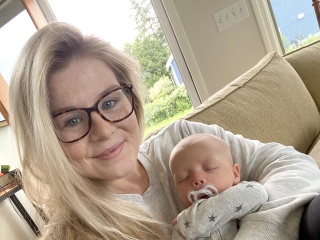Colorectal Cancer
Colorectal Cancer Care at UVM Cancer Center
Why Choose UVM Health?
At University of Vermont Health, you’ll receive advanced colorectal cancer care from trusted experts. Our team provides a patient-centered approach that includes comprehensive, state-of-the-art treatment and support for you and your family. Our experts develop a personalized treatment plan that may include enrollment in clinical trials only available at leading programs nationwide.
As a leading cancer program in the region, we offer:
- Expert care: You receive specialized care from highly skilled gastrointestinal surgeons, medical oncologists, radiation oncologists, pathologists and radiologists. As part of a health system anchored by an academic medical center, our physicians are also active researchers and physician-leaders.
- Innovation: We participate in prestigious cancer research networks and clinical trials that offer you additional care options for difficult-to-treat cancers.
- Minimally invasive procedures: If appropriate for your type of cancer, robotic technologies may be used to assist in removal of the cancer through small incisions. The precision of this technique typically leads to a faster recovery with less pain and fewer complications.
- Cancer screening: Facilities across our health system are equipped with state-of-the-art colonoscopy equipment to screen for colorectal cancer. These advanced tools provide more powerful imaging that allows us to view the inside of your colon and detect abnormalities.
Symptoms of Colorectal Cancer
Sage's Story: Colorectal Cancer
31-year-old Sage Collins details her experience with colorectal cancer diagnosis and treatment at University of Vermont Cancer Center. "My care team was remarkable. They're so knowledgeable of my disease I felt like I didn't have to do any of the thinking."
Diagnosing Colorectal Cancer
Colorectal Cancer Treatment
At UVM Health, you receive a personalized care plan based on your unique diagnosis. Our team uses the most advanced therapies, techniques and equipment to treat colorectal cancer. Throughout your cancer journey, our nurse navigators are by your side to coordinate appointments, answer questions and guide your care.
Clinical Trials
The UVM Cancer Center supports more than 100 active clinical trials focused on prevention, screening, treatment, supportive care and survivorship.

Locations Near You
Share your location to see nearby providers and availability
111 Colchester Avenue
Main Campus, East Pavilion, Level 3
Burlington, VT 05401-1473
75 Park Street
Elizabethtown, NY 12932
101 Adirondack Drive
Ticonderoga, NY 12883
111 Colchester Avenue
Main Campus, Main Pavillion, Level 2
Burlington, VT 05401
75 Beekman Street
Plattsburgh, NY 12901-1438
23 Fourth Street
Suite 1
Malone, NY 12953-1331
111 Colchester Avenue
Main Campus, Main Pavilion, Level 2
Burlington, VT 05401-1473
130 Fisher Road
Berlin, VT 05602-8132
23 Fourth Street
Suite 1 & 2
Malone, NY 12953-1331
130 Fisher Road, MOB-B
Suite 1-2
Berlin, VT 05602-9516


